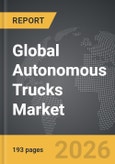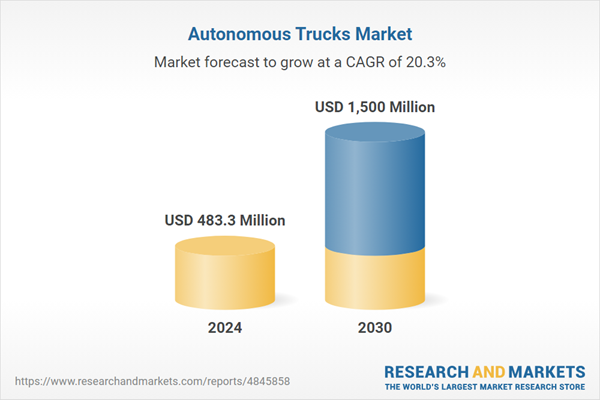Global Autonomous Trucks Market - Key Trends and Drivers Summarized
What Is Driving the Adoption of Autonomous Trucks in the Logistics Sector?
Autonomous trucks are emerging as a transformative solution in the logistics and transportation industry, promising enhanced safety, efficiency, and cost savings. These self-driving trucks use advanced technologies such as artificial intelligence (AI), machine learning, sensors, cameras, radar, and LiDAR systems to navigate and operate without human intervention. The growing need to address driver shortages, reduce operational costs, and increase the reliability of freight transport is driving the adoption of autonomous trucks. Companies are increasingly investing in autonomous trucking technologies to streamline logistics operations, reduce fuel consumption, and optimize route planning. The ability of autonomous trucks to operate continuously without breaks is particularly advantageous for long-haul freight transportation, making them a viable solution for improving supply chain efficiency.How Are Technological Advancements Shaping the Autonomous Truck Market?
Technological advancements are playing a critical role in shaping the future of autonomous trucks, making them safer, more efficient, and adaptable to various road conditions. Innovations in AI and machine learning are enhancing the decision-making capabilities of autonomous trucks, allowing them to interpret complex traffic situations and respond accordingly. The development of vehicle-to-everything (V2X) communication systems is enabling trucks to communicate with other vehicles, traffic signals, and infrastructure, improving situational awareness and safety. Furthermore, the integration of advanced driver-assistance systems (ADAS), such as adaptive cruise control, lane-keeping assistance, and automated emergency braking, is providing a foundation for higher levels of autonomy. The emergence of electric and hydrogen-powered autonomous trucks is also expanding the market potential by aligning with the growing emphasis on sustainability and reducing carbon emissions in transportation.Which Market Segments Are Leading the Adoption of Autonomous Trucks?
The autonomous truck market is segmented by type, component, application, and region. Types of autonomous trucks include fully autonomous and semi-autonomous trucks, with semi-autonomous trucks currently dominating the market due to regulatory constraints and the need for gradual adoption. Key components of autonomous trucks include hardware (sensors, cameras, LiDAR, radar) and software (AI algorithms, data analytics, fleet management systems), with software solutions gaining traction due to their role in decision-making and route optimization. Applications of autonomous trucks span long-haul freight, last-mile delivery, mining, agriculture, and construction, with long-haul freight being the largest segment due to the need for efficiency in cross-country and inter-state transportation. Geographically, North America and Europe lead the market for autonomous trucks due to high investments in R&D, favorable regulatory frameworks, and the presence of major technology providers, while Asia-Pacific is emerging as a high-growth region driven by rapid industrialization and increasing demand for automation in logistics.What Are the Key Drivers of Growth in the Autonomous Truck Market?
The growth in the autonomous truck market is driven by several factors, including advancements in AI and machine learning, the increasing need to address driver shortages, and the rising focus on reducing operational costs and enhancing logistics efficiency. The development of autonomous trucking technologies with enhanced safety features, real-time data analytics, and route optimization capabilities is driving their adoption in long-haul freight and supply chain operations. The growing emphasis on sustainability and the transition towards electric and hydrogen-powered autonomous trucks is expanding the market reach among logistics companies and fleet operators. The focus on developing robust cybersecurity solutions to address safety concerns and ensure compliance with global standards is creating new opportunities for innovation and market growth. Additionally, the rising number of strategic partnerships and collaborations among automakers, technology firms, and logistics providers is further supporting market expansion.Report Scope
The report analyzes the Autonomous Trucks market, presented in terms of market value (USD). The analysis covers the key segments and geographic regions outlined below.- Segments: Segment (Autonomous Trucks).
- Geographic Regions/Countries: World; United States; Canada; Japan; China; Europe (France; Germany; Italy; United Kingdom; and Rest of Europe); Asia-Pacific; Rest of World.
Regional Analysis
Gain insights into the U.S. market, valued at $135.5 Million in 2024, and China, forecasted to grow at an impressive 19.1% CAGR to reach $218.5 Million by 2030. Discover growth trends in other key regions, including Japan, Canada, Germany, and the Asia-Pacific.Why You Should Buy This Report:
- Detailed Market Analysis: Access a thorough analysis of the Global Autonomous Trucks Market, covering all major geographic regions and market segments.
- Competitive Insights: Get an overview of the competitive landscape, including the market presence of major players across different geographies.
- Future Trends and Drivers: Understand the key trends and drivers shaping the future of the Global Autonomous Trucks Market.
- Actionable Insights: Benefit from actionable insights that can help you identify new revenue opportunities and make strategic business decisions.
Key Questions Answered:
- How is the Global Autonomous Trucks Market expected to evolve by 2030?
- What are the main drivers and restraints affecting the market?
- Which market segments will grow the most over the forecast period?
- How will market shares for different regions and segments change by 2030?
- Who are the leading players in the market, and what are their prospects?
Report Features:
- Comprehensive Market Data: Independent analysis of annual sales and market forecasts in US$ Million from 2024 to 2030.
- In-Depth Regional Analysis: Detailed insights into key markets, including the U.S., China, Japan, Canada, Europe, Asia-Pacific, Latin America, Middle East, and Africa.
- Company Profiles: Coverage of players such as Hermes Robotics, KAMAZ PTC, MARS Auto, NVIDIA Corporation, Plus.ai and more.
- Complimentary Updates: Receive free report updates for one year to keep you informed of the latest market developments.
Some of the 44 companies featured in this Autonomous Trucks market report include:
- Hermes Robotics
- KAMAZ PTC
- MARS Auto
- NVIDIA Corporation
- Plus.ai
- QuickLoadz
- Siemens AG
- TomTom International BV
- Uber Freight LLC
- Uber Technologies, Inc.
This edition integrates the latest global trade and economic shifts into comprehensive market analysis. Key updates include:
- Tariff and Trade Impact: Insights into global tariff negotiations across 180+ countries, with analysis of supply chain turbulence, sourcing disruptions, and geographic realignment. Special focus on 2025 as a pivotal year for trade tensions, including updated perspectives on the Trump-era tariffs.
- Adjusted Forecasts and Analytics: Revised global and regional market forecasts through 2030, incorporating tariff effects, economic uncertainty, and structural changes in globalization. Includes historical analysis from 2015 to 2023.
- Strategic Market Dynamics: Evaluation of revised market prospects, regional outlooks, and key economic indicators such as population and urbanization trends.
- Innovation & Technology Trends: Latest developments in product and process innovation, emerging technologies, and key industry drivers shaping the competitive landscape.
- Competitive Intelligence: Updated global market share estimates for 2025, competitive positioning of major players (Strong/Active/Niche/Trivial), and refined focus on leading global brands and core players.
- Expert Insight & Commentary: Strategic analysis from economists, trade experts, and domain specialists to contextualize market shifts and identify emerging opportunities.
Table of Contents
Companies Mentioned (Partial List)
A selection of companies mentioned in this report includes, but is not limited to:
- Hermes Robotics
- KAMAZ PTC
- MARS Auto
- NVIDIA Corporation
- Plus.ai
- QuickLoadz
- Siemens AG
- TomTom International BV
- Uber Freight LLC
- Uber Technologies, Inc.
Table Information
| Report Attribute | Details |
|---|---|
| No. of Pages | 193 |
| Published | February 2026 |
| Forecast Period | 2024 - 2030 |
| Estimated Market Value ( USD | $ 483.3 Million |
| Forecasted Market Value ( USD | $ 1500 Million |
| Compound Annual Growth Rate | 20.3% |
| Regions Covered | Global |









